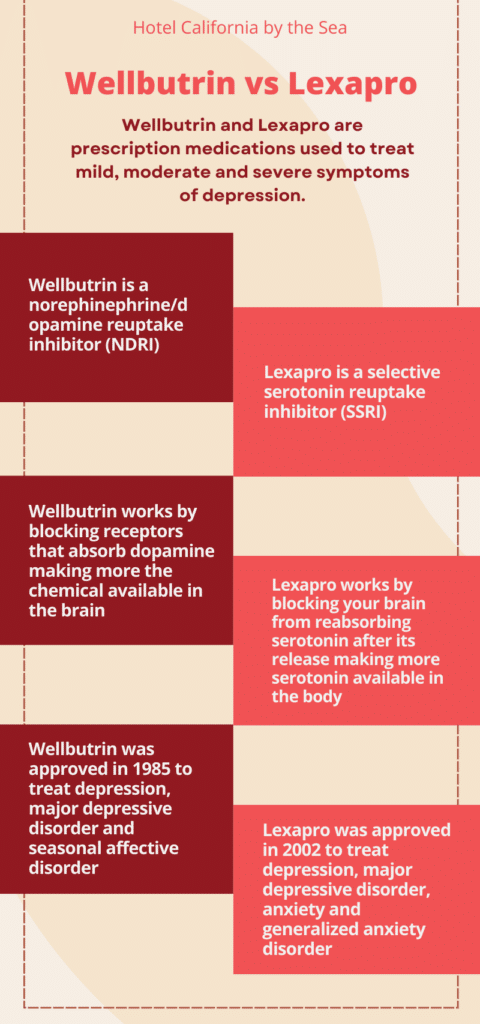Is Lexapro Addictive?
Mental health conditions such as anxiety and depression affect an estimated 20% of the U.S. population. It is one of the most common medical conditions affecting people across the nation. When it comes to treating depression, anxiety and other common mental health conditions, there are many options for treatments and medications. Lexapro is a prescription medication often recommended to help treat symptoms of depression, major depressive disorder, anxiety and generalized anxiety disorder. Similar to other prescription medications that can alter normal brain activity, Lexapro has the ability to become an addictive substance.
Lexapro is the brand name for the generic drug escitalopram. It is in the category of drugs called a selective serotonin reuptake inhibitor (SSRI). SSRIs work by blocking your brain from reabsorbing serotonin after its initial release into the body. In some cases, Lexapro helps to balance serotonin levels that may have become abnormal, causing a disruption in the natural function of the brain.

Serotonin is a chemical messenger in the brain that helps regulate mood, sleep, memory, stress response and a wide range of other functions in the body. In people who suffer from symptoms of depression, research has found their levels of serotonin are low. This is either due to a natural imbalance or due to the body quickly reabsorbing the chemical once it has been released. When less serotonin is reabsorbed, this then helps to increase the availability of the serotonin chemical for the body to utilize. This helps to reduce the negative symptoms of depression and anxiety as well as enhance mood.
Approved by the FDA in 2002, Lexapro is a prescription medication used to treat symptoms of depression and anxiety. However, it has since been prescribed for off-label usage where studies have seen significant benefits in treating other types of mental health conditions such as obsessive-compulsive disorder (OCD), post-traumatic stress disorder (PTSD), and many forms of eating disorders. The medication comes in an oral tablet or liquid solution. Patients begin to see changes and results on the drug within 1 – 2 weeks for physical symptoms, diminished symptoms of depression can start improving within 6 – 8 weeks.
Antidepressant prescription medications such as Wellbutrin and Lexapro are effective medications to help treat many types of mental health conditions. It is most commonly used to treat various depressive disorders as well as anxiety disorders. Depression is often caused by a chemical imbalance in a person’s brain and body. Symptoms of anxiety and depression include:
- Feeling sad
- Feeling empty
- Feeling worthless
- Feeling guilty
- Hopeless
- Loss of interest in activities once enjoyed
- Sleeping and eating disturbances
- Low energy and fatigue
- Difficulty concentrating
- Suicidal thoughts and behaviors
- Restlessness
- Irritability
- Muscle tension
These symptoms are often regulated and maintained by the neurochemicals called serotonin and dopamine. With substances like Lexapro and Wellbutrin working to increase these brain chemicals in the body, the user is more likely to experience a decrease in these negative symptoms.

Wellbutrin vs Lexapro
Wellbutrin and Lexapro are popular medications prescribed to treat mild, moderate to severe depression and anxiety. Both medications affect a person’s mood and mental health. These medications are often prescribed because they are less likely to impair memory and cause confusion. Both medications also have boxed warning labels explaining the increased risk of dangerous side effects including addiction. These labels are considered the most serious warning label issued by the FDA. Despite the ability to treat the same mental health conditions, Wellbutrin and Lexapro are different types of drugs that work different pharmacologically and target different aspects of brain chemical functions.
- Wellbutrin is a norepinephrine/dopamine reuptake inhibitor (NDRI).
- NDRIs block the reabsorption of norepinephrine and dopamine chemicals creating an increase of these chemicals for the body to use. Norepinephrine and dopamine are neurochemicals that can help regulate and boost mood. When more of these chemicals are available for use, the brain is able to readjust and help reduce unwanted symptoms of depression.
- Wellbutrin contains the active ingredient bupropion, which is an antidepressant.
- Wellbutrin was approved by the FDA in 1985 and is used to treat symptoms of depression, major depressive disorder and seasonal affective disorder.
- Off-label uses for Wellbutrin include the treatment of social anxiety disorder, attention deficit hyperactivity disorder (ADHD) and depressive episodes related to bipolar disorder.
- Common side effects of Wellbutrin include headache, weight loss, dry mouth, insomnia, nausea, constipation, irregular heart rate and moodiness.
- Lexapro is a selective serotonin reuptake inhibitor (SSRI).
- SSRI restricts brain cells from reabsorbing serotonin so the brain can accumulate more serotonin for use in the body. Serotonin is a type of chemical that affects functions of mood, stress response, appetite and addiction. With increased levels of serotonin, the body can better regulate mood and reduce negative symptoms of depression and anxiety.
- Lexapro contains the active ingredient escitalopram oxalate, which is a type of antidepressant.
- Lexapro was approved by the FDA in 2002 for the treatment of depression, major depression, anxiety and generalized anxiety disorder.
- Off-label uses for Lexapro include treating obsessive-compulsive disorders (OCD) and panic disorders.
Check Your Insurance Coverage for FREE
Find out if your insurance covers addiction treatment in minutes. We accept most insurance!
Is Lexapro Addictive?
Lexapro is a prescription medication that works to alter or readjust certain chemicals in the brain. Over time, the brain and body can begin to develop a dependence on the substances to maintain “normal brain functions.” Tolerance for the drug can also develop with continuous use, where a person will need to use more drugs in order to achieve the same effects. With Lexapro, dependence and tolerance can be formed quickly, leading to the development of an addiction.
When a person has been reliant on medications over long periods of time, the body eventually adjusts to the drugs in order to normally function. When a dose is missed or delayed, the dependence can cause unpleasant withdrawal reactions. The effects can be felt almost immediately, leading the user to quickly seek out the drug in order to feel “normal” again. This can lead to a gradual increase in daily dosage and ultimately the dependence and addiction to the drug.
Signs of Lexapro Addiction
- Withdrawal symptoms occur if a dose is missed or delayed.
- The development of rebound symptoms can occur and are intensified. These paradoxical effects include worsening depression or elevated anxiety.
- Needing a higher dose or more frequent dose of Lexapro in order to achieve symptom relief.
- Eventually, the body has fully adapted to the drug and it no longer works at alleviating symptoms of your mental health condition.
Common Side Effects of Lexapro Addiction
- Headache and dizziness
- Nausea and vomiting
- Sweating and fever
- Fatigue
- Restlessness
- Changes in body weight
- Blurred vision
- Hallucinations and confusion
- Irregular heartbeat
- Insomnia and other sleep disorders
- Changes in appetite
- Seizures
- Difficulty breathing
- Stiff muscles
- Suicidal thoughts and behaviors
- Serotonin syndrome
Serotonin syndrome is a rare but serious side effect of Lexapro misuse. Serotonin syndrome occurs when the serotonin levels in your body are too high. Excess serotonin chemicals in the peripheral and central nervous system can cause symptoms that can include agitation, fever, hallucinations, irregular heartbeat, muscle stiffness and restlessness. The risk of developing serotonin syndrome increases when Lexapro is mixed with other substances such as SSRIs, blood thinners or other types of antidepressant medications.
Reach out to Hotel California by the Sea
We specialize in treating addiction and other co-occurring disorders, such as PTSD. Our Admissions specialists are available to walk you through the best options for treating your addiction.
In extreme cases of misuse and addiction, Lexapro can cause users to attempt to commit suicide or have suicidal thoughts and behaviors. It can cause users to act on dangerous impulses, engage in aggressive or violent behaviors, worsening depression, have difficulty sleeping, extreme changes in mood and behavior. Hotel California by the Sea offers intensive and rigorous substance use disorder programs. Drug addictions such as Lexapro addiction can be difficult to overcome due to its impact on the brain’s mental and physical health.
The substance use disorder program offers drug detox, residential programs and outpatient programs. A variety of medication and therapeutic treatments including medication-assisted treatments (MAT), CBT, group therapy and EMDR therapy, are available at Hotel California by the Sea. These treatments help clients uncover the root causes of their addiction and address both the physical and psychological aspects of their addiction. Every client will receive an individualized care plan to help them recover and overcome their addiction.
References:
https://www.tryminded.com/blog/wellbutrin-vs-lexapro-which-medication-is-better-suited-for-me
https://www.verywellhealth.com/wellbutrin-vs-lexapro-uses-safety-dosing-storage-7560352
https://www.goodrx.com/conditions/depression/lexapro-vs-wellbutrin
https://www.ncbi.nlm.nih.gov/books/NBK557734/
https://www.verywellmind.com/anxiety-treatment-and-lexapro-dosage-and-side-effects-3024961
https://www.healthline.com/health/depression/lexapro-side-effects
